Welcome to the fourth part of my countdown of reading memories from the 2010s. You can read the previous instalments here: 50-41, 40-31, 30-21.
Something I’ve found interesting about this instalment in particular is that a couple of the books here (The Wake and Lightning Rods) just missed out on a place in my yearly list of favourites when I first read them. But they have stayed with me over the years, and their placing on my list reflects that.
This is one of my reasons for making this list: to see how my feelings about different books have (or haven’t) changed.
On to this week’s memories…
20. Mothers by Chris Power (2018)
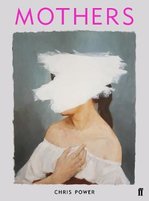
In late 2017, Daniel Davis Wood was preparing to launch Splice when he invited me to review this book. If not for that, I may never have read Mothers. The only thing I knew about Chris Power was that he’d written a Guardian column called ‘A Brief History of the Short Story‘. I didn’t know what was coming… and here we are in the top 20 of my list.
Three stories chronicling a woman’s relationship with her mother and daughter anchor the collection. The other stories reflect and illuminate those, resulting in a singular journey through the book. In its exploration of place and relationships, this is one of the most insightful story collections I’ve read.
19. The Wandering Pine by Per Olov Enquist, tr. Deborah Bragan-Turner (2015)
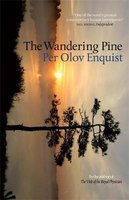
Here’s another example of serendipity. The Wandering Pine arrived as an unsolicited review copy. from MacLehose Press. It was a fictionalised autobiography by an author unknown to me. I had no particular expectations, nor any real reason to have them.
What I remember most is the depiction of Enquist’s childhood: growing up in a religious household in northern Sweden, and trying to reconcile that with his own developing feelings. It’s just one of the most vivid accounts of childhood I have read, and it had such an effect on me. The later sections, where Enquist is trying to overcome addiction, are equally memorable as they seem to invert the beginning.
18. Forgetting Zoë by Ray Robinson (2010)
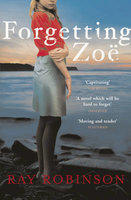
2010 for me was a time of exploring contemporary fiction and finding out more about what I liked. I first came across Ray Robinson’s name when the publisher Scott Pack was enthusing about Robinson’s work on his blog. A short while later, Robinson’s publisher offered me a review copy of his then-latest novel. It was all the impetus I needed.
Now, Ray Robinson is an author I will always want to read. It started here, with this novel of a girl and the man who holds her captive. I was struck by the vivid characterisation and sense of place, the way the book could still ratchet up tension even though you already knew things would turn out (relatively) all right.
17. Fever Dream by Samanta Schweblin, tr. Megan McDowell (2017)
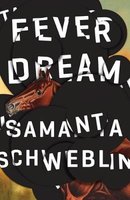
I’ve been part of a ‘shadow panel’ reading along with the International Booker Prize (and the Independent Foreign Fiction Prize before it) since 2014. This is one of the highlights of my reading year, and nearly always leads me to some gems. I first heard about Fever Dream when Tony Malone was listing his contenders for that year’s International Booker, and he felt Samanta Schweblin’s novel was a certainty.
Tony was right, as Fever Dream made it to the Booker shortlist. It was also my personal favourite from that year, the unsettling account of a woman rooting through her memories to work out how she ended up in hospital. There’s a sense that the narrator is discovering the story at the same time as the reader, and that left a strong impression behind.
16. The Wake by Paul Kingsnorth (2014)
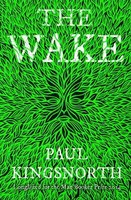
I’ve talked before in this list about liking historical fiction which acknowledges that history is constructed. Well, The Wake might be the most overt example of this on my list. It’s a novel set around the Norman Conquest, written in a version of Old English.
As with A Girl Is a Half-formed Thing, I found this relatively straightforward to read once I got into the style. That style is also key to the book’s effect. For me, it opens up the distance – the difference – between the reader and what might seem an overly familiar period of history. The Wake makes the future from that moment in time seem uncertain again, which gives the book a unique life.
15. Elizabeth is Missing by Emma Healey (2014)
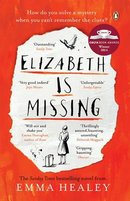
I know when I’m reading a special book, because I feel it bodily. There’s a kind of shivery, tingling feeling deep inside – the feeling of being more intensely alive. That’s what I read for.
Sometimes this is a happy feeling, sometimes it’s more troubling. This novel brought the latter. A mystery whose protagonist has dementia… The narration just works so well, drawing you into Maud’s perspective, an eternally renewing present. It’s haunting because we can see the connections that she can’t. I finished this book in a daze.
14. Lightning Rods by Helen DeWitt (2011)
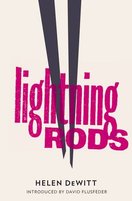
Like Martin John from a couple of weeks ago, Lightning Rods is a powerful book based on ugly subject matter – in this case, a salesman’s system for providing ‘executive relief’ to high-flying businessmen. But where Martin John brings the reader towards empathy, Helen DeWitt makes her readers complicit in the exploitation she writes about.
Lightning Rods is mostly written in bland corporate language that twists its rhetoric to suit the needs of Joe, the salesman. Whatever objection someone may have to his product, Joe is there with a pat answer. Nobody, including the reader, is given time to stop and think – until the end, when the prose style changes. I can still remember that shift in tone, like waking from a dream that needed to be shaken off.
13. Such Small Hands by Andrés Barba, tr. Lisa Dillman (2017)
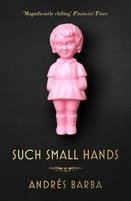
I don’t have a region or language of particular interest when it comes to translated fiction – I’ve enjoyed books from all over. But I have probably read more fiction translated from Spanish than any other language, and some of it nearly always ends up among my year’s favourites.
Such Small Hands is a good example of a particular sort of book that I like: short, strange, twisted reality, told partly through the prose style itself. (There are about five of these translated from Spanish alone on my list.) This unsettling tale of a girl growing up in an orphanage is built on the fluid logic of childhood,which casts the reader adrift in the best way.
12. Reservoir 13 by Jon McGregor (2017)
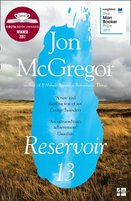
I don’t think I have ever read anything by Jon McGregor that I didn’t love. More than any other author, he showed me that fiction could still be otherworldly without a trace of the fantastical. He brings out the strangeness in the everyday like few other writers I’ve read.
My introduction to McGregor’s work was through short stories, but this novel is the book I remember most strongly. Examining a rural community in the years, following a girl’s disappearance, it is a symphony in words. Year by year, layer by layer, McGregor chronicles the lives that change (or, sometimes, stay the same) and the natural world underpinning everything. It’s a spellbinding performance.
11. Mend the Living by Maylis de Kerangal, tr. Jessica Moore (2016)

I had read Maylis de Kerangal’s Birth of a Bridge previously. It was interesting for its long, kaleidoscopic sentences, but in no way did it prepare me for this. De Kerangal’s technique is like having a cloud of words surrounding the events she describes, there to illuminate the different dimensions of experience.
Mend the Living applies this to a heart transplant, so we see the precision of medical language clashing with human emotions, and the different meanings a heart can have as it goes from powering one life to another. I remember this book being vertiginous to read, because it kept opening up in unexpected directions.
7th June 2020 at 11:43 am
So many great novels in this batch. I loved Mend the Living, the Ray Robinson (Scott got me onto him too), and Lightning Rods is forever etched on my mind!
12th June 2020 at 5:41 pm
Thanks for your comment Annabel. I don’t think I could forget any of those three once read!
7th June 2020 at 4:01 pm
Lighting Rods is etched on my mind too. Hard for it not to be. Extraordinary novel, in several senses.
The Barba too, in a very different way. Physically beautiful hardcover edition too which is always a bonus.
The Wake I’ve yet to read, though that element of making the past present – capturing that to those living it what was to come was yet unwritten – that’s hard to do. Most historical fiction I’ve looked at felt like history, but it can’t have to those who were there. This right now is someone’s future history, but it feels present to me.
Reservoir 13 I really do have to prioritise. Shame they plastered so many labels over the cover. I always feel I’m being harangued when I pick it up. Silly I know.
9th June 2020 at 7:32 pm
Again you’ve included some of my own favourites – Fever Dream and Lightning Rods particularly. Can’t wait for the top ten.